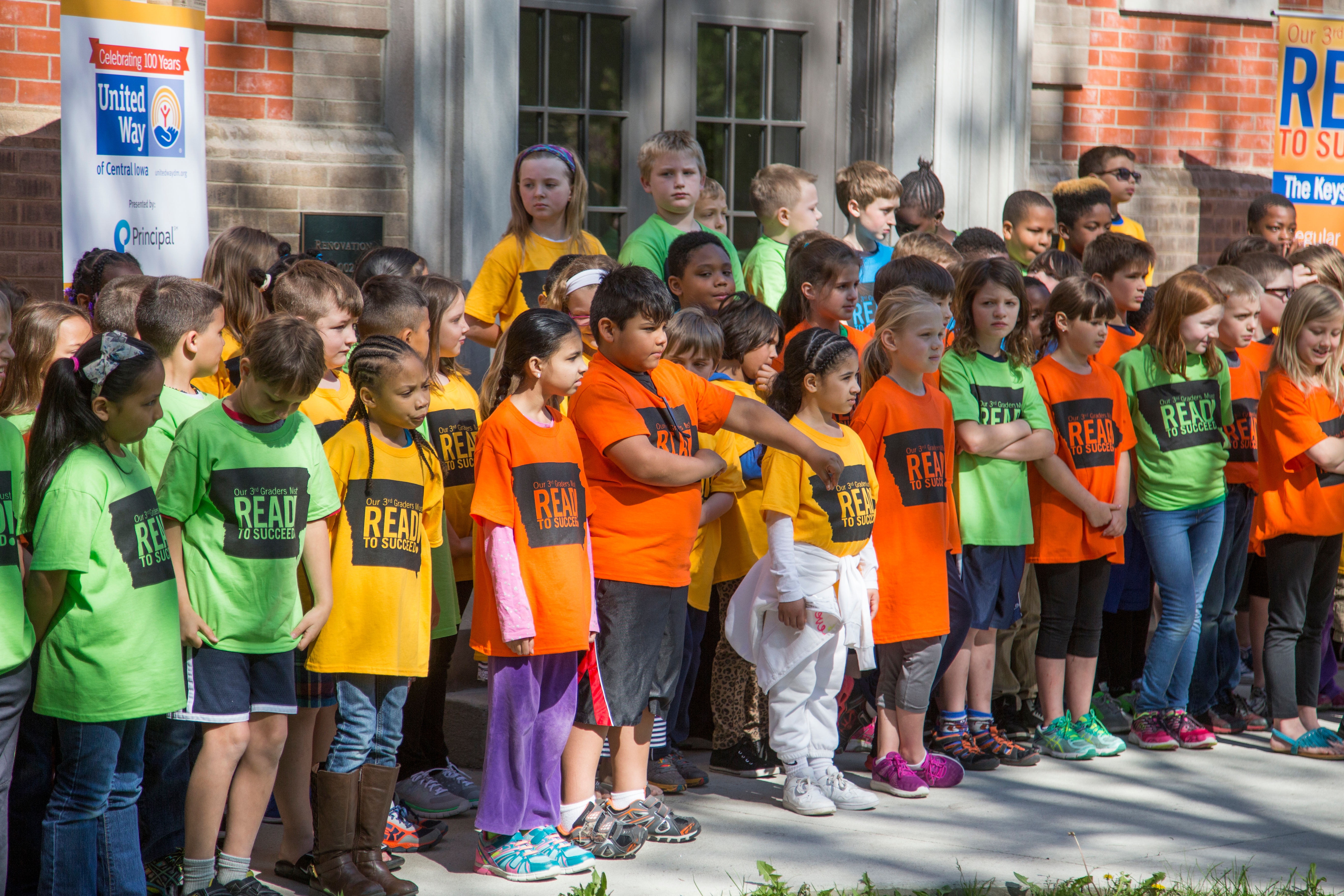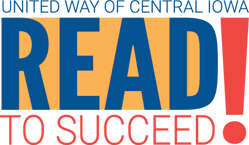15-Second Version:
United Way of Central Iowa launched READ to SUCCEED to help central Iowa parents & caregivers, volunteers and organizations understand the importance reading proficiently by the end of third grade, and find ways they can help ensure students have the resources and activities they need to be successful.
3-Minute Version:
Reading proficiently by third grade is the most important predictor of high school graduation and later career success. That is why the READ to SUCCEED campaign was selected by United Way of Central Iowa for a community-wide action campaign.
From kindergarten through third grade, students are learning to read. But after third grade, students are reading to learn. By fourth grade, teachers expect students to apply the skills taught in the earlier grades to new and challenging information. Those students who are not able to read proficiently miss out on learning opportunities.
Children must read to succeed. Yet every year, a disproportionate number of children in low-income miss this milestone. In Central Iowa, more than 1 student in 5 is not reading proficiently by the end of third grade.
We know why children in low-income homes are disproportionately reading below grade level. And this is where we have the opportunity to close the gap by focusing on four key areas:
School readiness,
Parent and caregiver engagement,
Summer learning loss, and
Quality out-of-school programs.
In the READ to SUCCEED campaign, United Way and a network of businesses, schools, nonprofits will provide programming, toolkits, advocacy and volunteer opportunities to improve the life prospects for the nearly 1,500 central Iowa students who are not reading at grade level by the end of third grade.
United Way and its community partners in READ to SUCCEED commit to making sure that all kindergarteners are starting school with the necessary skills, that parents are reading and engaging with their children, that there are quality academic learning opportunities during after school hours and during the summer months.
And when we do these things, when we commit to making sure that all third graders in Polk, Dallas, and Warren Counties are reading proficiently at grade level by the time they complete third grade, we will build stronger futures for our children and our community.
10-Minute Version:
Reading proficiently by third grade is the most important predictor of high school graduation and later career success. That is why the READ to SUCCEED campaign was selected for a community-wide action campaign.
From kindergarten through third grade, students are learning to read. But after third grade, students are reading to learn. By fourth grade, teachers expect students to apply the skills taught in the earlier grades to new and challenging information. Those students who are not able to read proficiently miss out on learning opportunities.
Children must read to succeed. Yet every year, a disproportionate number of children in low-income miss this milestone. In Central Iowa, more than 1 student in 5 is not reading proficiently by the end of third grade; the majority of those kids are English language learners, low-income students, or minorities.
Teaching a child to read is a commitment to the future of that child. In the READ to SUCCEED campaign, United Way has committed to increasing the number of central Iowa third graders who read proficiently.
We know why children in low-income homes are disproportionately reading below grade level. And this is where we have the opportunity to close the gap by focusing on four key areas:
School readiness,
Parent and caregiver engagement,
Summer learning loss, and
Quality out-of-school programs.
Just as there is an achievement gap in school performance, there is a school readiness gap that separates disadvantaged children from their more affluent peers. In Central Iowa, 45 percent of the children who took the kindergarten readiness assessment in the fall did not have the appropriate skills needed to learn. We know that learning begins long before a child enters kindergarten.
Children, even infants, soak up words, rhymes, songs, and images. A child’s physical health, including recognizing developmental delays in a timely manner, is another critical aspect of school readiness. We can better prepare children to succeed in school by providing home visits to help parents and caregivers succeed in promoting early language and literacy.
By increasing community-wide efforts to create language-rich and book-rich environments for children before they start school. By improving the availability of and access to high quality early care and learning opportunities for children across a variety of settings. And finally, providing universal comprehensive health screenings with the appropriate follow-up, intervention, and supports, helps ensure children start kindergarten ready to learn and succeed.
Parents are the first and most important teachers in their children’s lives, their children’s best advocate. We know that parents need to talk, read, sing, and interact with their children and that how they interact makes all the difference in the development of their children’s vocabulary, comprehension, and critical thinking skills.
Research shows that by age 3, children from families in low-income heard as many as 30 million fewer words than their more affluent peers. Similarly, by age five, a typical middle-income child recognized 22 letters of the alphabet compared to only 9 letters for a child from a low-income family.
So, how do we help parents engage with their children in such a way to promote literacy? By promoting and tracking early childhood developmental milestones. By exposing children to a wide range of age appropriate books. By supporting parents to close the word gap by singing, talking, and reading to children—which in some cases may mean teaching a parent how to read a book to their child and how to use the right technology in the right way.
Most central Iowa school calendars have a 3-month summer break. This means that children are losing ground during the summer months. The summer vacation breaks the rhythm of instruction, leads to forgetting, and requires that a significant amount of time be spent reviewing old material when students return to school in the fall.
For children from households in low-income, the long break is of even greater concern, creating a reading gap of about three months between middle and lower class students.
Research consistently shows that children who are engaged in constructive learning activities during the summer go back to school in the fall with very little learning loss. And the kids who don't have access to those kinds of opportunities don't have the same advantages when they go back to school in the fall. By the end of third grade, they will have lost almost an entire year due to the “summer slide.”
These learning losses are cumulative. For millions of low-income kids, summer learning loss decreases their likelihood of attending college or even earning a high school diploma.
United Way and READ to SUCCEED address the loss of learning during summer vacations: by encouraging children to read over the summer and providing access to books—books that they select themselves so they love what they're reading and because they're interested in what they're reading. We must provide information to students, to their parents, and to their caregivers about programs, services, and opportunities that are available- especially those that are high quality, but free or low-cost. And we must provide summer meals, physical activities, and health and nutrition information in a variety of accessible settings.
In central Iowa, 77 percent of students live in households where both parents are working. During the hours that the children are out of school, they are either in some sort of care setting or are unsupervised. In Iowa, 115,000 children are alone and unsupervised after school. Quality out-of-school-time programs are those that provide quality interaction between students, adults, and peers; include academic enrichment activities; are sustained over long periods of time. Students in out-of-school quality care improve their academic performance, improve their grades, have better school attendance, and improved behavior.
As you can see, ensuring a child reads proficiently is a complex issue, with many factors involving parents, caregivers, schools and out-of-school time. READ to SUCCEED will shine a light on the resources and support needed to help the nearly 1,500 central Iowa students Iowa who are not reading at grade level by the end of third grade.
United Way and its community partners in READ to SUCCEED will commit to making sure that all kindergarteners are starting school with the necessary skills, that parents are reading and engaging with their children, that there are quality academic learning opportunities during after school hours and during the summer months.
And when we do these things, when we commit to making sure that all third graders in Polk, Dallas, and Warren Counties are reading proficiently at grade level by the time they complete third grade.






%20-%20No%20Tagline.png?width=180&name=211%20Logo%20-%20color%20(white%20bubble)%20-%20No%20Tagline.png)

